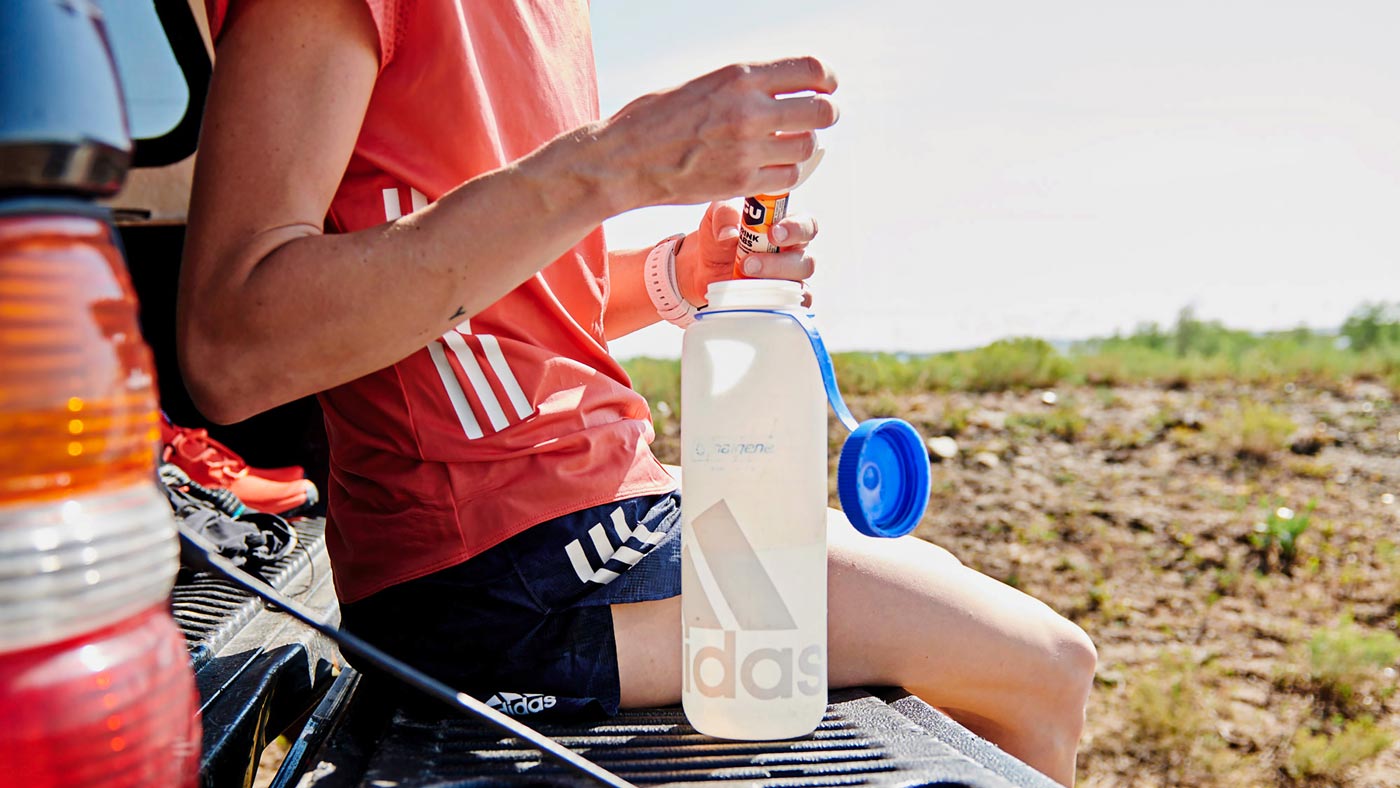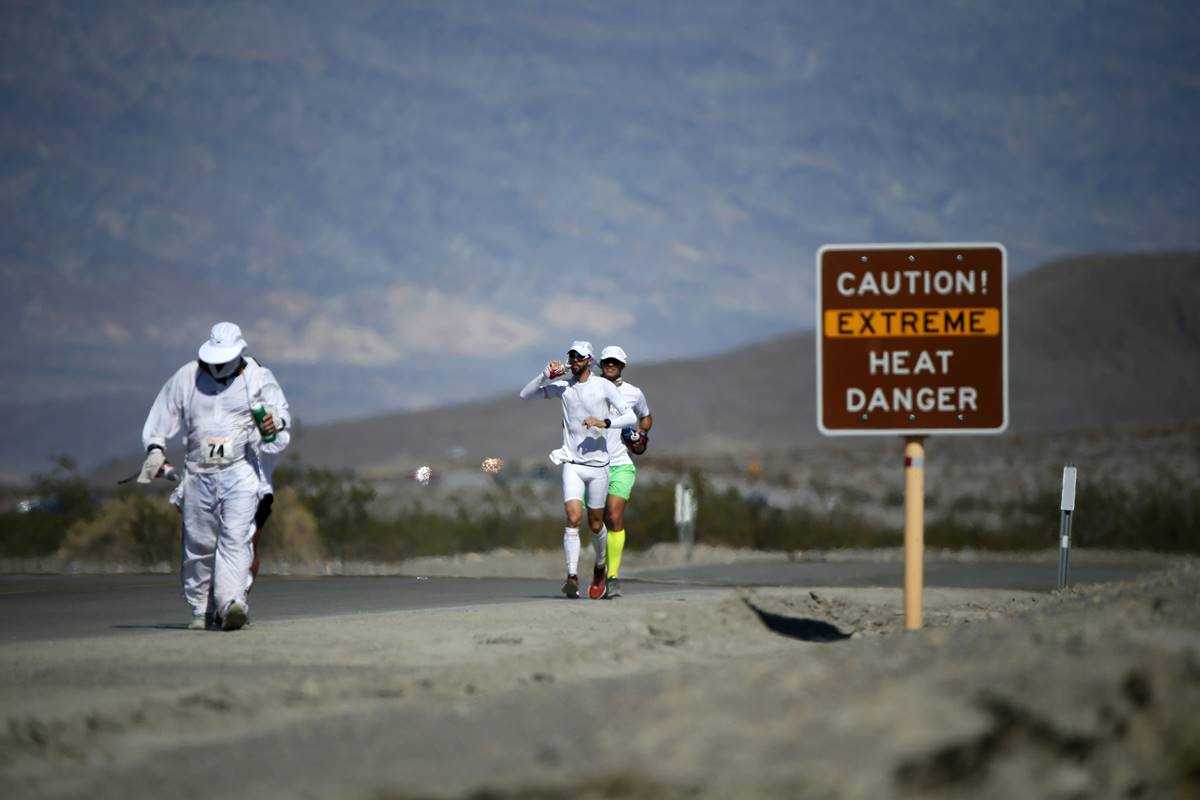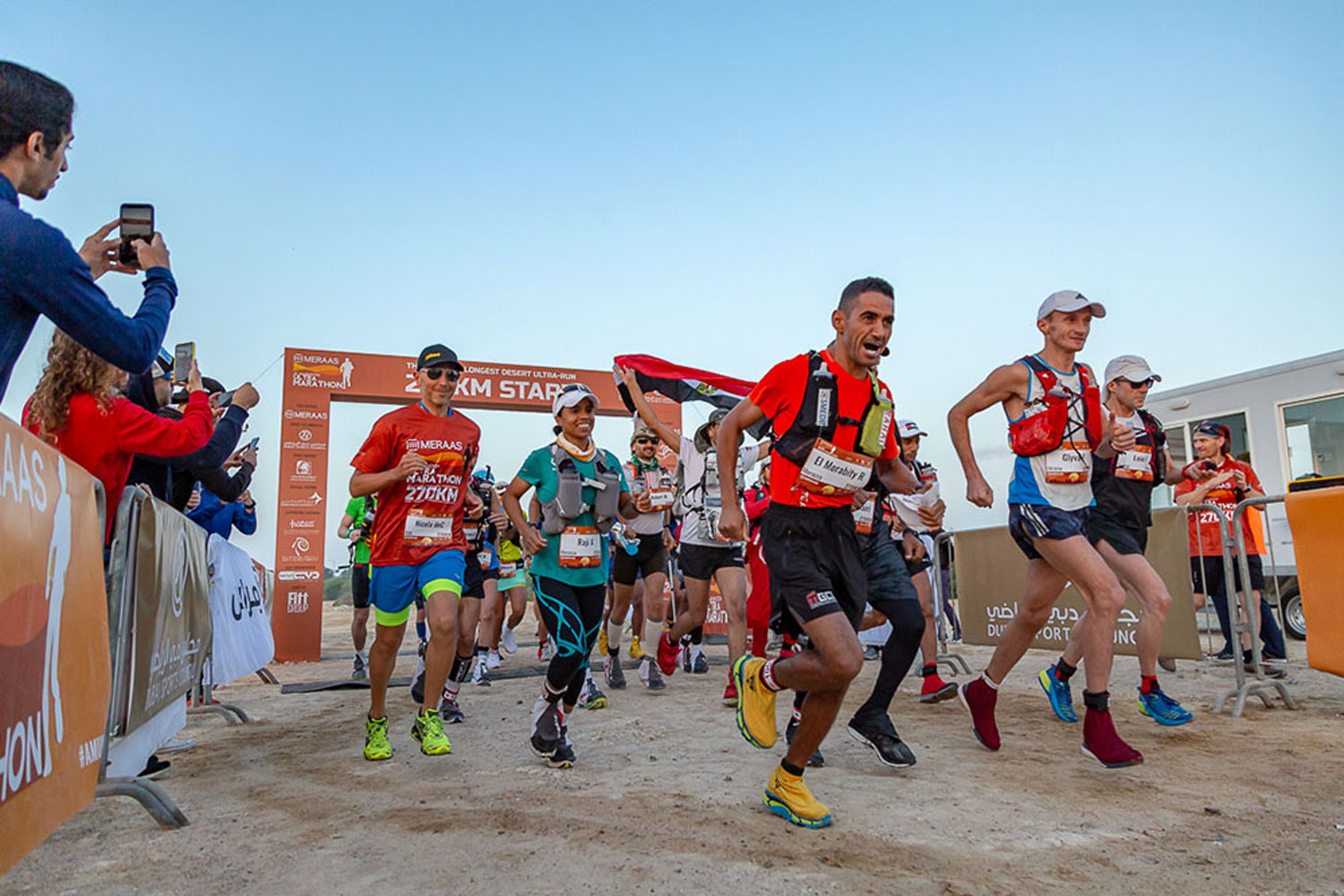Home>Misc>Featured>How Much Water To Drink During An Ultramarathon


Featured
How Much Water To Drink During An Ultramarathon
Modified: January 2, 2024
Discover the recommended amount of water to drink during an ultramarathon in this featured guide, and optimize your hydration strategy for peak performance.
Introduction
Welcome to the world of ultramarathons, where runners push their limits and cover incredible distances. It’s a thrilling and challenging endeavor that requires immense physical and mental strength. Alongside the focus on training and nutrition, hydration plays a crucial role in ensuring success and maintaining health during these demanding races.
In an ultramarathon, your body goes through intense exertion and dehydration can occur rapidly. Staying hydrated is not just a matter of comfort, but a vital aspect of performance and well-being. Adequate hydration helps maintain body temperature, supports proper muscle function, and facilitates efficient nutrient absorption. Without proper hydration, runners risk facing complications like heat exhaustion, muscle cramps, and electrolyte imbalances.
Understanding the significance of hydration and having a strategic hydration plan in place can be the difference between reaching the finish line strong or struggling to complete the race. In this article, we will delve into the various factors that influence your water needs during an ultramarathon and discuss effective hydration strategies to optimize your performance.
Importance of hydration during ultramarathons
Hydration is crucial for any athletic endeavor, but its importance is amplified during ultramarathons due to the prolonged nature of the event and the increased strain on the body. Proper hydration plays a vital role in maintaining performance, preventing heat-related illnesses, and ensuring overall well-being.
One of the key functions of water in the body is regulating body temperature. During an ultramarathon, your body generates a significant amount of heat, which needs to be dissipated to prevent overheating. Sweating is the primary mechanism by which your body attempts to cool down. However, excessive sweating without replenishing fluid losses can lead to dehydration, compromising your body’s ability to regulate its temperature and increasing the risk of heat exhaustion or heatstroke.
Dehydration can also impair muscle function. When your body is dehydrated, it affects the delivery of oxygen to the muscles, causing fatigue, decreased strength, and impaired coordination. This can significantly impact your ability to maintain a steady pace and may lead to a decline in performance.
Proper hydration ensures efficient nutrient absorption. During endurance activities, your body relies on carbohydrates for energy. Water is necessary for the digestion and absorption of these carbohydrates, allowing your body to access the fuel it needs for optimal performance. Inadequate hydration can hinder the absorption of nutrients, leading to decreased energy levels and reduced endurance.
In addition to physical performance, adequate hydration is crucial for overall health and well-being during an ultramarathon. It helps maintain the balance of electrolytes in your body, which are essential for proper muscle and nerve function. Electrolyte imbalances can lead to muscle cramps, weakness, and even more severe complications like hyponatremia or water intoxication.
In summary, staying properly hydrated is vital for maintaining performance, preventing heat-related illnesses, supporting muscle function, facilitating nutrient absorption, and ensuring overall well-being during an ultramarathon. Neglecting hydration can have serious consequences on your ability to sustain your effort and put your health at risk. Therefore, it is essential to prioritize hydration and develop effective strategies to stay adequately hydrated throughout your ultramarathon.
Factors affecting water requirements
Several factors influence the amount of water you need to consume during an ultramarathon. Understanding these factors can help you develop a personalized hydration plan that meets your specific needs and optimizes your performance.
1. Duration and intensity: The duration and intensity of the ultramarathon are primary factors that determine how much water you should drink. Longer and more intense races will result in increased sweat rates and higher fluid losses, requiring a greater volume of water intake to replace those losses.
2. Environmental conditions: The environmental conditions, such as temperature, humidity, and altitude, significantly impact your fluid requirements. Hot and humid weather can cause you to sweat more and lose fluids at a faster rate. Likewise, high altitude can increase your respiratory rate and fluid losses, necessitating higher water intake.
3. Individual sweat rate: Each person has a unique sweat rate influenced by factors such as body size, metabolism, and fitness level. Monitoring your sweat rate during training runs can provide invaluable information for estimating your fluid needs during the ultramarathon.
4. Hydration status: Your pre-race hydration status also affects your water requirements during the race. If you start the race already dehydrated, you will need to consume more water to replenish those deficits. Monitoring your urine color can provide an indication of your hydration status. Clear or light-colored urine suggests good hydration, while dark-colored urine indicates dehydration.
5. Nutritional strategy: Your nutritional strategy during the race can also influence your water requirements. If you consume foods or energy gels that are high in sodium, it can increase your thirst and fluid needs. Moreover, if you rely on carbohydrate-rich foods, such as gels or energy bars, you may require more water for efficient digestion and absorption of these nutrients.
It is essential to consider all these factors when calculating your water requirements for an ultramarathon. It is recommended to consult with a sports nutritionist or a coach experienced in ultramarathons to help determine a personalized hydration plan that fits your unique needs.
Calculating water needs during ultramarathons
Accurately calculating your water needs during an ultramarathon is crucial to avoid dehydration or overhydration. While individual requirements can vary, there are some general guidelines you can follow to estimate your water intake.
1. Estimate sweat rate: Start by determining your sweat rate during training runs. Weigh yourself before and after a run to measure the difference. Each pound lost is roughly equivalent to 16 ounces (480 ml) of fluid. This will give you an idea of your average sweat rate per hour, which you can then use as a guide for your fluid intake during the race.
2. Consider environmental conditions: Adjust your fluid intake based on the environmental conditions you expect during the race. If it’s going to be a hot and humid day, or if you anticipate running at a high altitude, you may need to increase your fluid intake to account for higher sweat rates.
3. Aim for fluid balance: The goal is to maintain fluid balance, meaning the amount of fluid you consume should be close to the amount you lose through sweat. Aim to replace roughly 80-100% of your fluid losses during the race. This can be achieved by consuming fluids at regular intervals and monitoring your hydration status through urine color.
4. Listen to your body: While general guidelines are helpful, it’s important to listen to your body and adjust your fluid intake accordingly. Everyone’s hydration needs are different, and what works for someone else may not work for you. Pay attention to thirst cues and consume fluids when you feel the need.
5. Practice during training: Use your training runs as an opportunity to fine-tune your hydration strategy. Experiment with different fluid intake volumes and frequencies to find what works best for you. Keep in mind that hydration needs can change with the duration and intensity of the run, so it’s essential to practice under similar conditions to the race.
Remember that these calculations serve as a starting point and may need to be adjusted based on your individual needs and experiences. It’s always recommended to test and refine your hydration plan during training before implementing it in an actual ultramarathon.
Hydration strategies
Proper hydration strategies are essential for maintaining optimal performance and preventing dehydration during an ultramarathon. Here are some effective strategies to help you stay adequately hydrated:
1. Start well-hydrated: Begin the race well-hydrated by consuming fluids in the days leading up to the event. This will help ensure that you start with a good hydration status and reduce the risk of dehydration early on.
2. Follow a schedule: Have a hydration schedule in place to remind yourself to drink at regular intervals. Aim to consume fluids every 15-20 minutes, even if you don’t feel thirsty. This will help maintain a constant fluid intake and prevent dehydration.
3. Use a mix of fluids: Hydration is not just about water. Include electrolyte-rich fluids or sports drinks in your hydration plan to replenish the electrolytes lost through sweat. These drinks can help maintain proper muscle function and prevent hyponatremia.
4. Carry fluids with you: Consider carrying a hydration pack or a handheld bottle during the race to have easy access to fluids. This allows you to drink whenever needed, especially in stretches where aid stations are far apart or during longer sections of the race.
5. Take advantage of aid stations: Aid stations are strategically placed throughout the race route. Use them to refill your water containers and stock up on fluids. Make sure to take advantage of these opportunities to top up your hydration levels when needed.
6. Incorporate solid hydration sources: In addition to fluids, consider incorporating solid hydration sources like watermelon slices, oranges, or other water-rich fruits into your race nutrition plan. These can provide both hydration and energy.
7. Monitor your urine color: Use urine color as an indicator of your hydration status. Aim for a pale yellow color, which suggests good hydration. Dark-colored urine indicates dehydration and should prompt you to increase your fluid intake.
8. Consider the use of electrolyte supplements: If you tend to sweat excessively or are running in extreme conditions, electrolyte supplements like sodium tablets or salt capsules can help replenish electrolytes lost through sweat and maintain good hydration status.
Remember, each runner is unique, and it may take some trial and error to find the hydration strategies that work best for you. It is essential to experiment with different approaches during training runs to determine what keeps you adequately hydrated and performing at your best.
Tips for optimizing water intake during an ultramarathon
Optimizing your water intake during an ultramarathon is crucial for maintaining hydration and ensuring peak performance. Here are some valuable tips to help you stay adequately hydrated throughout the race:
1. Plan your hydration strategy in advance: Before the race, develop a detailed plan for when and how much water you will consume at regular intervals. This will prevent you from forgetting to hydrate and ensure you stay on track with your fluid intake.
2. Set reminders: Use your watch, phone, or other devices to set hydration reminders at specific intervals during the race. This will help you stay disciplined and consistent with your water intake even when you’re focused on running.
3. Sip slowly: Rather than chugging large amounts of water at once, sip slowly and consistently throughout the race. This allows your body to better absorb the fluids and reduces the risk of discomfort or stomach issues associated with consuming excessive amounts at once.
4. Alternate water and sports drinks: Consider alternating between water and electrolyte-rich sports drinks during the race. This helps replenish both water and electrolyte losses, maintaining proper hydration and supporting optimal muscle function.
5. Take advantage of aid stations: Utilize aid stations as opportunities to replenish your water supply and hydrate. Make sure to hydrate before leaving each aid station, even if you don’t feel thirsty at that moment.
6. Use thirst as a guide: While it’s essential to have a hydration plan, listen to your body’s thirst cues as well. If you feel thirsty, take it as a sign that you need to drink more water. Thirst is an early indicator of dehydration, and it’s important to address it promptly.
7. Consume hydrating foods: In addition to fluids, consume hydrating foods like watermelon, cucumber, or oranges during the race. These foods provide both water and essential nutrients and can help maintain hydration levels.
8. Be mindful of electrolytes: Alongside water intake, pay attention to your electrolyte levels. If you’re sweating heavily or running in hot conditions, consider incorporating electrolyte supplements or consuming foods rich in sodium, potassium, and other electrolytes.
9. Practice your hydration strategy during training: Experiment with different hydration strategies during your training runs to determine what works best for you. This will help you fine-tune your approach and feel confident in your hydration plan on race day.
Remember, staying adequately hydrated is a continuous effort throughout the race. Regularly assess your hydration status, adjust your water intake as necessary, and stay proactive in managing your fluids to perform at your best.
Potential risks of overhydration during ultramarathons
While proper hydration is essential during ultramarathons, it’s important to be aware of the potential risks of overhydration, a condition called hyponatremia. Hyponatremia occurs when the sodium levels in your body become diluted due to excessive fluid intake.
Here are some potential risks associated with overhydration during ultramarathons:
1. Electrolyte imbalance: Overhydration can disrupt the delicate balance of electrolytes in your body, particularly sodium. Sodium is critical for proper muscle and nerve function. When sodium levels in the blood are too low, it can lead to muscle cramps, confusion, seizures, and, in severe cases, even coma or death.
2. Hyponatremia symptoms: Early signs of hyponatremia may include nausea, headache, confusion, and swelling. As it progresses, symptoms can become more severe, such as vomiting, seizures, respiratory distress, and unconsciousness. It’s vital to recognize and address these symptoms promptly.
3. Misinterpretation of thirst cues: Overhydration can occur when runners misinterpret their thirst cues, leading them to drink excessive amounts of water or fluids despite not being dehydrated. It’s important to listen to your body and drink when you’re truly thirsty rather than trying to overcompensate.
4. Increased risk in slower runners: Slower runners may be at a higher risk of overhydration due to a longer race duration. The extended period of fluid consumption without significant sweat losses can result in an imbalance in the body’s sodium levels.
5. Dilution of nutrient levels: Overhydration can dilute the concentration of other essential nutrients in the body, affecting their absorption and utilization. This can impact overall performance and energy levels during the ultramarathon.
Preventing overhydration involves striking the right balance between fluid intake and sweat losses. To minimize the risk, it is crucial to:
– Have a hydration plan in place with appropriate fluid volumes and frequencies based on your individual needs.
– Monitor your urine color to assess hydration status and adjust fluid intake accordingly.
– Consume electrolyte-rich fluids or sports drinks alongside water to help maintain proper electrolyte balance.
– Be mindful of your body’s thirst cues and drink accordingly rather than forcing excessive amounts of fluids.
– Seek medical attention immediately if you or someone else shows signs of severe hyponatremia.
By being aware of the risks of overhydration and adopting a sensible hydration approach, you can ensure that you stay properly hydrated while minimizing the potential dangers of hyponatremia during an ultramarathon.
Conclusion
Hydration is of utmost importance during ultramarathons, as it directly affects your performance, well-being, and overall success in the race. Proper hydration helps regulate body temperature, supports muscle function, facilitates nutrient absorption, and prevents heat-related illnesses.
Factors such as race duration, intensity, environmental conditions, individual sweat rate, hydration status, and nutritional strategy all influence your water requirements during an ultramarathon. It’s crucial to consider these factors and develop a personalized hydration plan that meets your specific needs.
To optimize your water intake, it is essential to follow a hydration strategy that includes proper planning, setting reminders, sipping fluids at a steady pace, alternating between water and sports drinks, utilizing aid stations, consuming hydrating foods, and paying attention to electrolyte balance. Practice and experimentation during training runs will help you refine your hydration plan to find what works best for you.
While staying adequately hydrated is crucial, it’s equally important to be aware of the risks of overhydration, such as hyponatremia. Overhydration can lead to electrolyte imbalances and severe health complications. Monitoring your fluid intake, recognizing your thirst cues, and seeking a balance between hydration and sweat losses can help prevent overhydration.
In conclusion, proper hydration is a vital aspect of ultramarathon training and racing. By understanding your water requirements, developing a personalized hydration plan, and following effective strategies, you can optimize your performance, prevent dehydration, and ensure a safe and successful ultramarathon experience. Stay hydrated, listen to your body, and embark on your next ultramarathon with confidence!









